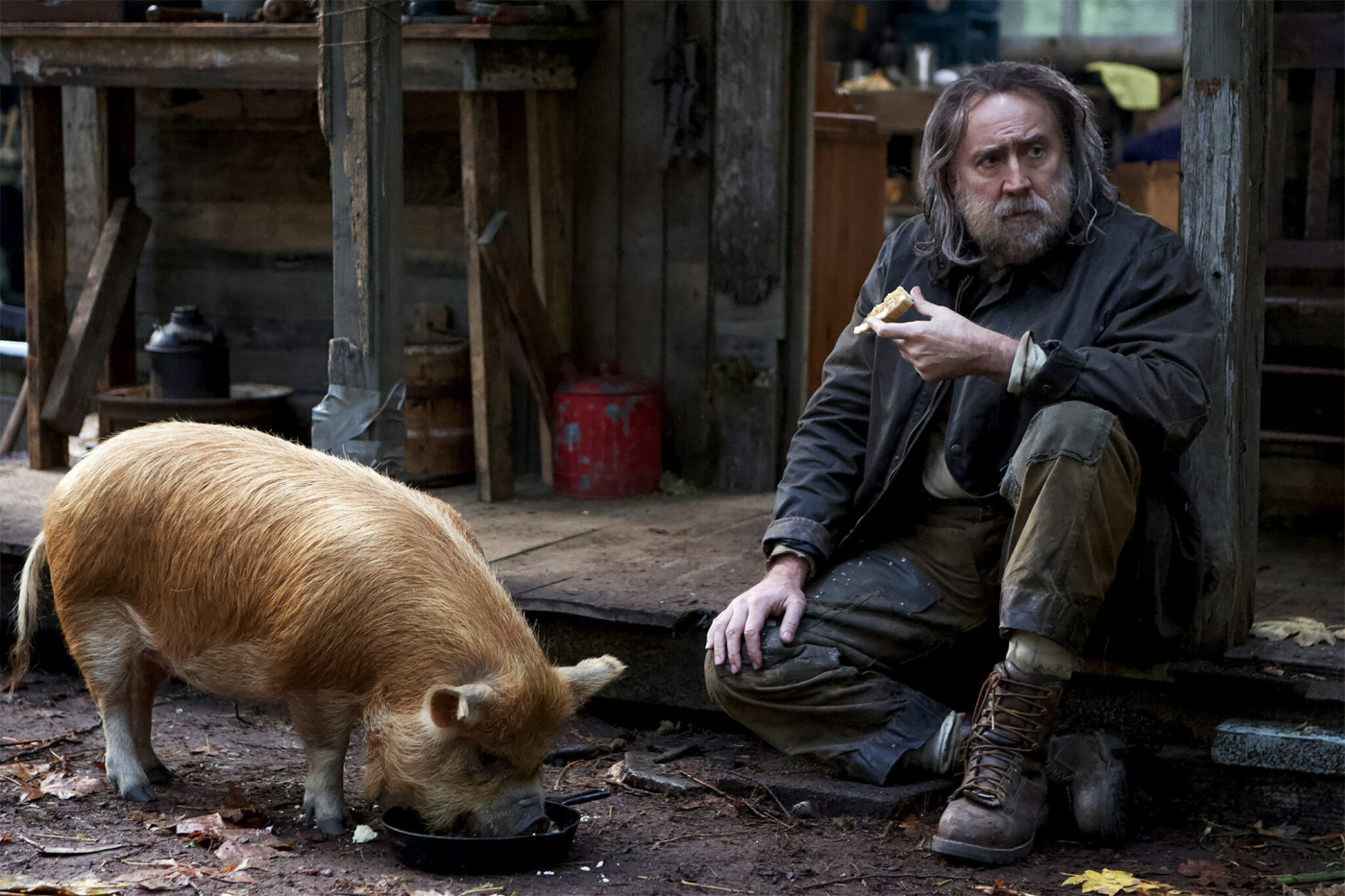
Rasherman | Review: Nicolas Cage in Pig
Nicolas Cage’s new film, about a man and his beloved pig, takes on food culture and masculinity in crisis – but Neil Stewart thinks something about it is a bit off

Nicolas Cage’s new film, about a man and his beloved pig, takes on food culture and masculinity in crisis – but Neil Stewart thinks something about it is a bit off

In a hut in the Oregon woods, a once famous chef lives a life of rustic simplicity. His only companion is a well-natured ginger pig who snuffles her way to black truffles, which the man sells on to a restaurant supplier, this weekly fungi-for-funds exchange seemingly his only contact with the outside world. One night, this idyll erupts into violence: the man’s hut is invaded, he’s beaten unconscious – and when he wakes the next morning, his precious pig is gone.
So starts 2021’s most unlikely revenge thriller, in which bereft Rob (Nicolas Cage) enlists the help of his city-slicker restaurant contact Amir (Alex Wolff) to track down his porcine friend. On the way they’ll encounter drug addicts, the scabrous hidden side of the ostensibly genteel Portland, underground fighting rings, soulless chefs, very expensive wine, family tragedy, and the Machiavellian restaurant supplier Darius (Adam Arkin). “I just want my pig back,” Rob grunts in each fresh scenario, bruised eyes glittering, voice dangerously low. The tone, in short, is not quirky: Pig is mythic, macho and very serious about what it wants to say. But what does it want to say?

Nicolas Cage in Pig
For one thing, it wants to talk about men. There’s something not very 2021, or maybe precisely 2021, in a film from a male writer-director which is so intent on exploring the limits of maleness. (No-one among the minimal female cast has any agency; the script seldom gives them names, and they’re variously in service industries, a junkie, and a corpse.) Rob’s wife is dead and Darius’s wife is comatose following a suicide attempt, and, bereft of counterexamples, Pig suggests that the widower will inevitably revert to macho archetype: a woodsy hunter-gatherer who renounces all things worldly, or emotionless villain – I nearly said “swine” – who puts financial success above all else and would willingly sell out his family for profit. A third prominent male character, the beaming Derick Finway (David Knell), head chef of very high end restaurant Eurydice (the restaurants in this film get more significant names than the women) is reduced to blubbering when his avant-garde pretensions are skewered and he admits that all he ever really wanted to do was open “an English pub”, but that nobody in Portland wants that: the implication is that Chef Finway has been emasculated by food culture itself. There is interesting material made here, but the film’s suggestion that nobody “really” enjoys fancified Michelin-esque food, either making or consuming it, is again too binary. When Rob finally cooks, by contrast, the meal he constructs – in dreamy Chef’s Table close-up – is essentially chicken and potatoes done fancy, and unlike Eurydice’s food this simple, delicious meal has terrific clout for those who taste it: it’s emotive, nostalgic, transformative food. Via its characters’ reactions, Pig manages to reveal what good food can do and what we might want from it, even if as the audience we cannot taste this particular dish. (I’d argue that the frou-frou can be as transcendently wonderful as the simple stuff done well, and that an either-or view of things is unnecessarily simplistic.)
this Fight Club-via-Lynch set piece left me wishing there had been something more to it
More rewardingly odd, though frustrating, is the scene where Cage leads his obedient sidekick Amir, who seems not to have much else to do with his days but trot after the weirdo woodsman, into a secret underground lair where kitchen staff – men only, of course – brawl with each other for money. Though it hints intriguingly at a much stranger film (the soundtrack leans in, choreographing brutal beatings to the Flamingos’ deeply sinister doo-wop “I Only Have Eyes for You”), in the end the scene is a rather clunky McGuffin to put Rob on the trail of the missing pig, and add another quarter-hour to the runtime. Occasionally there’s a moment in a film where you think, “The characters are only behaving this way because they know they’re in a film”, and this Fight Club-via-Lynch set piece left me wishing there had been something more to it – for instance, we seem halfway to a satirical point about restaurant staff on minimum wage needing to go to extreme measures to get more money, but the film won’t commit to either satire or weirdness.
Pig’s greatest success is in casting Nicholas Cage – who, in my mind’s eye and perhaps other people’s, has his face set permanently in an open-mouthed howl of overacting or, if you like, hamminess. This lends the film a rewarding metafictional tension: starting out with Cage’s character being, in short order, robbed, beaten, assaulted and humiliated sets us an expectation that he will eventually explode in vengeful rage Mandy-style, an anticipation the film enjoyably subverts. Instead, he hulks his way through the film matted, stained, blood-streaked near mute, embodying inarticulable suffering far more than desire for vengeance. I’ll remember this performance when the rest of this frustrating, fitfully charming film has faded from memory. What can’t be cured, he says without words, must be endured C